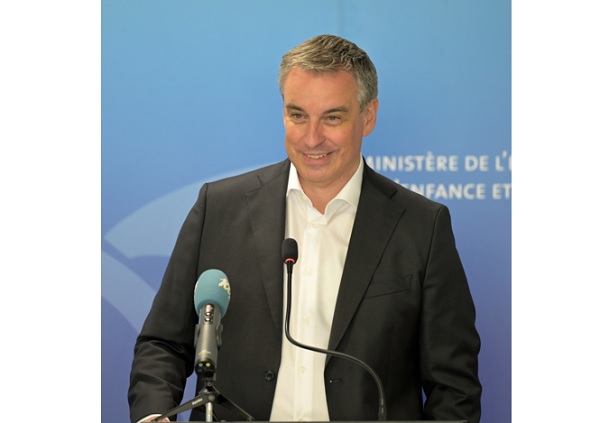 Claude Meisch, Luxembourg’s Minister of Education, Children and Youth;
Credit: MENEJ
Claude Meisch, Luxembourg’s Minister of Education, Children and Youth;
Credit: MENEJ
On Wednesday 13 September 2023, Luxembourg’s Minister of Education, Children and Youth, Claude Meisch, presented changes for the 2023/2024 school year.
“This return to school […] is like previous ones, marked by a panoply of innovations, consolidations and extensions in the fields of education, childhood and youth, in the continuity of the modernisation and qualitative development efforts undertaken in recent years. The momentum to adapt offers to the realities and requirements of our modern society must continue, regardless of future political constellations,” emphasised Minister Meisch, who also welcomed “a well-prepared start to the school year”.
At the level of classical secondary education, new sections will become available: Section P, which focuses on cognitive and human sciences, and Section R, with a focus on policies and sustainable development, which, according to the Ministry of Education, Children and Youth, correspond to the major challenges of our time, namely understanding how the world works, taking into account current society and human beings to measure impacts on the environment and vice versa.
In general secondary education, the ministry noted it will introduce two new sections: the G3S section on Natural sciences, computer sciences and mathematical sciences and the GT2S Technology, sport and health, aimed at students interested in sports sciences linked to new technologies and health.
In the field of professional training, new courses are available in the social area: the Certificate of Professional Aptitude (CCP) Daily Support Assistant and the Vocational Aptitude Diploma (DAP) Inclusion Agent. In the technological field, the Technician Diploma (DT) training in electromobility is starting.
The 2023/2024 school year also marks the start of a new chapter in the long history of the private technical school Emile Metz (LPEM), located in Luxembourg-Dommeldange; it is opening a second site in Differdange, which will be developed over the coming years. The LPEM offers English-speaking sections in several specialisations. “This is an important new step to meet the demand for professional training in English which comes not only from English-speaking residents, but also from residents with other linguistic backgrounds,” explained Minister Meisch.
In primary school education, the start of the school year marks an important step towards a new study plan. “After an extensive consultation of more than a year and a half with around 1,200 participants and the collection of some 6,000 suggestions, the white paper for a study plan adapted to the requirements of the 21st century is now available and I am confident that the plan of studies itself will be able to be ready for 2025", rejoiced Minister Meisch, who wanted to involve education professionals in the consultation process, but also parents and students so that the new education plan studies is widely supported. This new plan will be organised around the pillars of well-being, participation, multilingualism and digitality.
Also in primary school education, the French literacy pilot project is now in its second year, continuing in four primary schools and, according to the ministry, constitutes an important step forward in adapting the education system to the linguistic reality of the Grand Duchy. The “Zesumme wuessen – literacy in French” (growing together) project benefits from the experience of public European schools which offer students the choice of their language of literacy.
Legislative changes have led to a series of adaptations concerning the fight against school dropout and students’ well-being. The ministry is now in charge of monitoring compulsory education and no longer the municipalities. “It is important not to lose sight of any young person in order to be able to support all students on their path towards a qualification,” pointed out Minister Meisch in the context of the extension of compulsory education from sixteen to eighteen years of age from 2026. This arsenal also includes the Socio-Professional Integration Centres (CISP) which are aimed at students aged twelve and over with psychosocial and academic difficulties which place them at risk of dropping out of school. Currently, four CISPs with 110 spots in total exist in Luxembourg.
Voted in June 2023, the law on student well-being and inclusive education introduces an educational and psychosocial department in each secondary school, better support for students with specific educational needs in secondary schools and the establishment of a student protection delegate (DPE) in secondary education. The DPE's missions are to promote respect for the rights of the student and the prevention and protection against any form of mistreatment and danger going against the well-being of the student, raise awareness and offer advice and support for the school community, information on the procedures to follow and the development and organisation of training related to the protection of students.








